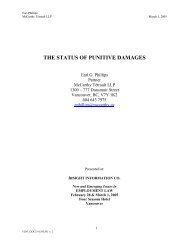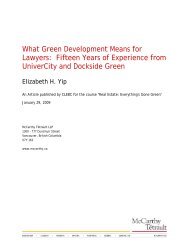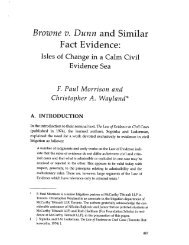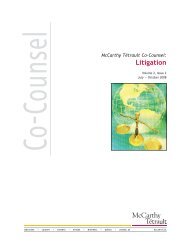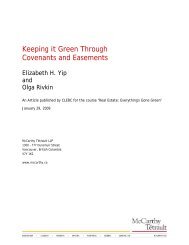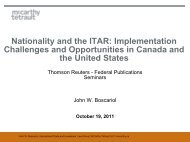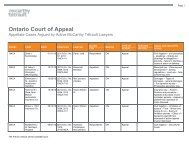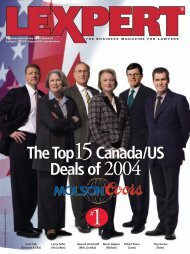The Doctrine of Public Policy in Canadian Contract Law
The Doctrine of Public Policy in Canadian Contract Law
The Doctrine of Public Policy in Canadian Contract Law
Create successful ePaper yourself
Turn your PDF publications into a flip-book with our unique Google optimized e-Paper software.
<strong>The</strong> <strong>Doctr<strong>in</strong>e</strong> <strong>of</strong> <strong>Public</strong> <strong>Policy</strong> <strong>in</strong> <strong>Canadian</strong> <strong>Contract</strong> <strong>Law</strong> 1 29<br />
pr<strong>in</strong>ciples that are necessary to explore its relationship with the larger doctr<strong>in</strong>e<br />
<strong>of</strong> public policy. '49<br />
Although contracts <strong>in</strong> restra<strong>in</strong>t <strong>of</strong> trade have been regarded as <strong>in</strong>valid for<br />
nearly six hundred years,'" the modern doctr<strong>in</strong>e is generally considered to have<br />
orig<strong>in</strong>ated with the follow<strong>in</strong>g statement <strong>of</strong> Parker C.J. <strong>in</strong> Mitchel:<br />
[tjo conclude, <strong>in</strong> all restra<strong>in</strong>ts <strong>of</strong> trade where noth<strong>in</strong>g more appears, the law<br />
presumes them bad; but if the circumstances are set forth that presumption is<br />
excitided and the court is to judge <strong>of</strong> those circumstances, and determ<strong>in</strong>e accord<strong>in</strong>gly.<br />
If on them, it appears to be a just and honest contract, it ought to be<br />
ma<strong>in</strong>ta<strong>in</strong>ed.'51<br />
Prior to this decision, "all restra<strong>in</strong>ts <strong>of</strong> trade, whether general or partial, were<br />
regarded as totally void because <strong>of</strong> their tendency to create monopolies."' 2 <strong>The</strong><br />
decision <strong>of</strong> Parker C.J. had the effect <strong>of</strong> curtail<strong>in</strong>g this logic by recogniz<strong>in</strong>g that<br />
certa<strong>in</strong> <strong>in</strong>stances <strong>of</strong> restra<strong>in</strong>t <strong>of</strong> trade were permissible. It brought to the fore<br />
the contemporary rationale beh<strong>in</strong>d <strong>in</strong>validat<strong>in</strong>g contracts <strong>in</strong> restra<strong>in</strong>t <strong>of</strong> trade,<br />
i.e., that "where the restra<strong>in</strong>t is general not to exercise a trade throughout the<br />
k<strong>in</strong>gdom...Tit] must be void, be<strong>in</strong>g <strong>of</strong> no benefit to either party and only be<strong>in</strong>g<br />
oppressive."'"<br />
Subsequent to Mitchel, the ideology which compelled the <strong>in</strong>validation <strong>of</strong><br />
contracts <strong>in</strong> restra<strong>in</strong>t <strong>of</strong> trade gradually became more focused upon the <strong>in</strong>dividual<br />
liberty <strong>in</strong>terest <strong>in</strong>volved than upon the fact that such agreements prejudiced<br />
the economic welfare <strong>of</strong> society.'54 As famously formulated <strong>in</strong> Nordenfelt v.<br />
Maxim Nordenfelt Guns & Ammunition Co,'" the modern test for when a<br />
restra<strong>in</strong>t should be valid is dependant upon whether the restriction is reasonable<br />
"<strong>in</strong> reference to the <strong>in</strong>terests <strong>of</strong> the parties concerned and reasonable <strong>in</strong> reference<br />
to the <strong>in</strong>terests <strong>of</strong> the public."'" However, the actual basis <strong>of</strong> the pr<strong>in</strong>ciple was<br />
there<strong>in</strong> stated to be as follows:<br />
149 For a recent discussion <strong>of</strong> the restra<strong>in</strong>t <strong>of</strong> trade doctr<strong>in</strong>e <strong>in</strong> Canada, see Rosemary Scott,<br />
"Post-Employment Restra<strong>in</strong>ts: A Trail <strong>of</strong> Broken Promises" <strong>in</strong> Todd L. Archibald &<br />
Randall Scott Echl<strong>in</strong>, eds., Annual Review <strong>of</strong> Civil Litigation, 2006 (Toronto: Carswell/<br />
Thomson, 2007) 93 at 94.<br />
150 <strong>The</strong> pr<strong>in</strong>ciple is sometimes traced to Dyer's Case (1413) Anon., Y.B. Hen. V. Pasc. No.<br />
2.<br />
151 Mitchel, supra note 35 at 197.<br />
152 Cheshire, supra note 7 at 449-450.<br />
153 Mitchel, supra note 35 at 182.<br />
154 This is partially reflected <strong>in</strong> the more str<strong>in</strong>gent treatment <strong>of</strong> restrictive covenants between<br />
employers and depart<strong>in</strong>g employees, where there may exist an <strong>in</strong>equality <strong>of</strong> barga<strong>in</strong><strong>in</strong>g<br />
power, than restrictive covenants aris<strong>in</strong>g out <strong>of</strong> the sale <strong>of</strong> a bus<strong>in</strong>ess: see Elsley v. J.G.<br />
Coll<strong>in</strong> s Ins. Agencies Ltd., [1978] 2 S.C.R. 916, 1978 CarswellOnt 1235 at paras. 15-<br />
16.<br />
155 [1894] A.C. 535 (H.L.) [Nordenfelt].<br />
156 Ibid. at 565.




